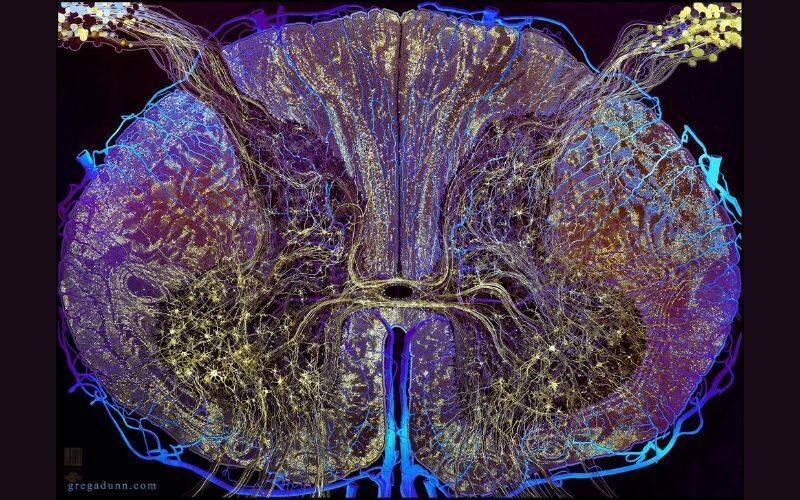Image by Greg Dunn and Brian Edwards, Spinal Cord, 22K gold handmade gilded microetching 2021-2022
New Report on the Future Directions in Compassion Science
April 2024
A new report into future directions into compassion science by the International Charter for Compassion and the Global Compassion Coalition’s science coordinators Dr. Lynne Reeder, and Dr. Marcela Matos draws on the latest scientific research into the multiple dimensions of compassion, its effects on our brains and bodies work and its impact in social relationships.
There are many scientific studies now that show that different motives organise our minds and bodies quite differently. For example, the way our attention is directed, our thoughts are focused, and our intended behaviours are enacted differ significantly as to whether our motives are competitive self-focused, anger or fear based, or cooperative and compassion based.
In study after study harnessing and stimulating compassion has been shown to foster improved mental and physical health, and to have profound effects on social relationship in families, groups communities and between communities.
In her interview, Prof Sue Carter indicated how the science of compassion reveals very specific physiological systems underpinning it such as the hormone oxytocin and associated prosocial behaviours. Her studies have found that compassion for the suffering of others has positive survival attributes, and the mechanisms underlying compassion provide new approaches to the healing power of positive social behaviors.
Prof Tania Singer Director of the Social Neuroscience Lab, Max Planck Society in Germany has been one of the world leaders in understanding how our brains work in relationship to compassion and compassion training. She has shown that compassion, empathy, and mindfulness training stimulate different brain systems which can work together. Her studies highlight that …compassion training works by supporting the upregulation of our systems of care and affiliation…because in compassion you accept the reality that is out there, but you activate the system which will allow you to be resilient against the potential negative effect of overwhelm and empathic distress. Therefore, advancing the understanding of the neurobiology of compassion and its application is a crucial evidence-based research undertaking.
The report outlines many practical applications of compassion, with implications for business and commerce. At Stanford University, studies conducted by Assoc Prof Daniel Martin found that compassion training can improve the psychological safety and well-being of employees and therefore mitigate the negative behaviours within businesses that can disrupt valuable innovations.
Perhaps one of the most important lines of inquiry for future directions in compassion science relates to containing humanity’s dark side. Prof Paul Gilbert OBE has studied extensively the inhibitors of compassion noting that we can be notoriously callous and indifferent to suffering, as well as seeking to create suffering (e.g, torture) on purpose for reasons of power, as to deterrence and even pleasure. Viewing compassion as simply about kindness, does not recognise the courage and wisdom needed to stand against humanity’s dark side.
Reinforcing these civilising capacities of compassion, Director of the Greater Good Science Centre, Dr Emiliana Simon-Thomas affirmed that …in our journey as a human species we have survived by being sensitive to one another. … that sensitivity was the evolutionary quality or adaptation that has led to our intelligence as a species and these studies are generating more and more evidence that compassion works.
Overall, the report confirmed that the mental experiences and the evolutionary origins of compassion, the biological structures and processes implicated in compassion, the degree to which compassion is universal and variable across cultures, and the exploration of the potential impact of training compassion on personal well-being, the quality of relationships, organizational success, and society more broadly - are all vital areas of study that will continue to guide future directions in compassion science.
To further support scholars’ wanting to engage in compassion science - this Future Directions report includes forty potential PhD questions that will be disseminated to universities and research centres across the world to progress the research already occurring in those groundbreaking centres.
Intentionally shifting to a motivation of compassion is humanity’s biggest challenge and this report has investigated and contributed to the emerging research and analysis for how that might happen.
Contact:
Dr. Lynne Reeder – Science and Research Coordinator - Charter for Compassion
Dr. Marcela Matos – Science and Research Coordinator - Global Compassion Coalition


